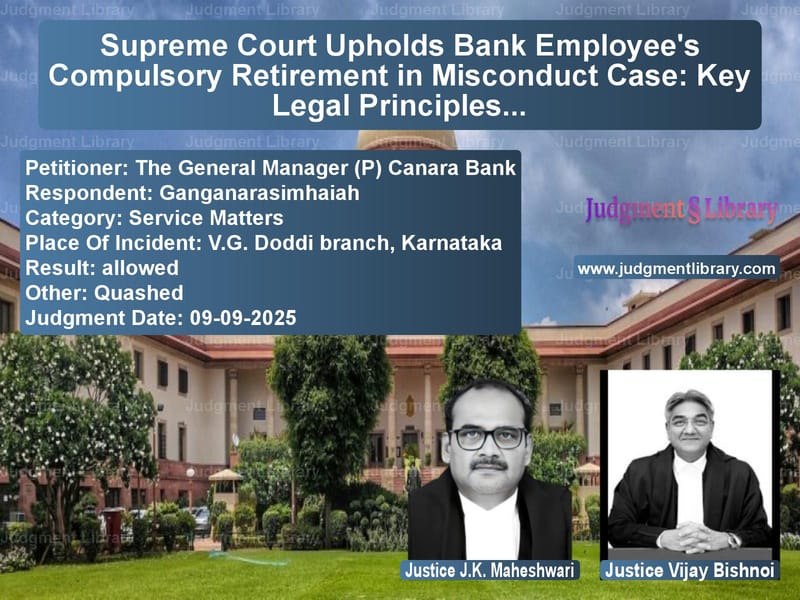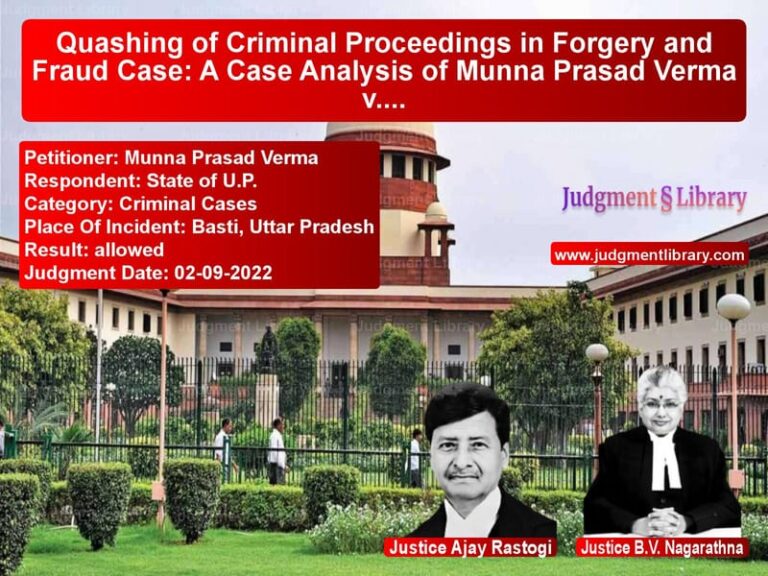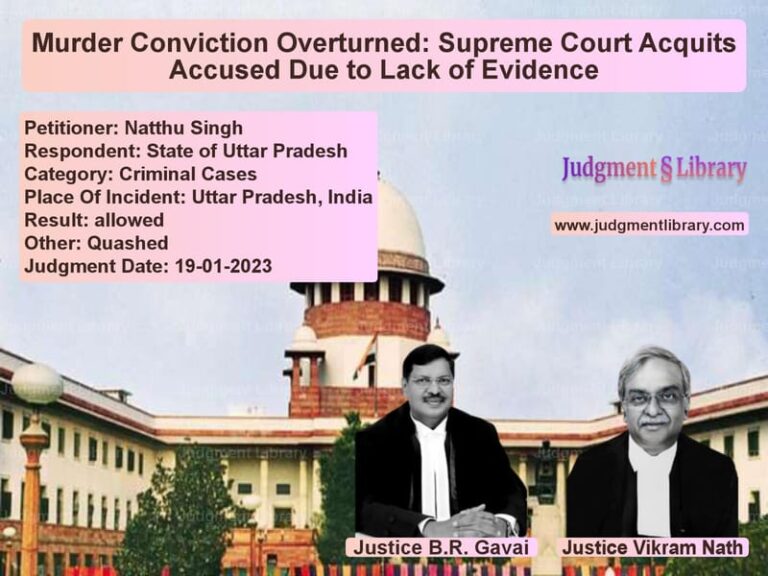Supreme Court Upholds Bank Employee’s Compulsory Retirement in Misconduct Case: Key Legal Principles Explained
In a significant judgment delivered on September 9, 2025, the Supreme Court of India restored the punishment of compulsory retirement imposed on a Canara Bank employee for serious misconduct involving unauthorized transactions and tampering with bank records. The case, which had traveled through multiple judicial forums over nearly two decades, finally reached resolution in the nation’s highest court, setting important precedents about disciplinary proceedings in banking sector and the limits of judicial review in such matters.
The case centered around Ganganarasimhaiah, who had joined Canara Bank as a daily wage sub-staff in 1990 and was later confirmed as Duftery-cum-Cash Peon. The trouble began when the bank’s V.G. Doddi branch, where the respondent was posted from 1997 to 2004, reported serious irregularities in its advances portfolio. An investigation revealed that the respondent had been involved in multiple unauthorized activities, including making illegal entries in bank accounts, tampering with official records, and coercing the branch manager to sanction loans to his family members without proper procedures.
The bank’s case against the respondent was comprehensive. The disciplinary authority noted that “the Respondent admitted in his statement at 24.07.2004 that he got SB 2450 opened in the name of Smt Suvarnamma, wife of CSE on 19.12.1997. She is not working and not doing any business but she goes to tailoring training class. He had taken the TODs in this account and repaid the same. The CSE has posted the relevant slips in his own handwriting.” This admission formed a crucial part of the evidence against him.
The bank’s counsel argued vigorously before the Supreme Court, emphasizing that “the Tribunal while exercising jurisdiction under Section 11A of the Industrial Disputes Act had exceeded its jurisdiction and acted as a Court of Appeal. It is contented that, though, the Tribunal vide order dated 17.05.2013 had held that the Disciplinary Enquiry against the Respondent was fair and proper, had re-appreciated the evidence and had interfered with the punishment order illegally.” The bank further contended that “the finding of the Tribunal, to the effect that the management did not produce any evidentiary material to prove the charges against the Respondent is perverse and bad in law.”
The bank’s legal team also highlighted the special nature of banking services, arguing that “the customers put their trust in the banks and deposit their money with the belief that their money would be safe in the banks. In such a condition, if an employee of the bank indulges in malpractices or irregularities in maintaining the accounts of the customers, then the faith of the general public would erode in the banking system.”
On the other side, the respondent’s counsel presented a different perspective, arguing that “the High Court had not committed any illegality in passing the impugned order because the Appellant did not produce any evidence to prove that the unauthorized entries and tampering of the records were done by the Respondent.” The defense also contended that “the Enquiry Officer also failed to examine two material witnesses, namely Shri Ramakrishnaiah and Shri R.R. Hoover and the Enquiry Officer did not obtain an expert opinion to verify whether the disputed entries were made in the handwriting of the Respondent.”
The respondent’s counsel further asserted that “the statement of admission of guilt by the Respondent, that are relied upon by the Appellant, were involuntary as they were taken under threat and coercion. It is asserted that the Respondent has only studied till 7th standard and it is difficult to comprehend that he, not being an educated person, had made the entries in the bank accounts of his father or that of any other customers.”
The Supreme Court, in its detailed analysis, relied heavily on established legal principles governing disciplinary proceedings. The bench comprising Justice J.K. Maheshwari and Justice Vijay Bishnoi emphasized that “It is well settled that when a Disciplinary Enquiry against a delinquent for alleged misconduct is initiated and in the said Disciplinary Enquiry, he/she is found guilty and subsequently punished, the court before which a challenge is made by the delinquent, is required to examine and determine the following aspects: (i) Whether the enquiry was held by the competent authority? (ii) Rule of natural justice has been complied with or not; (iii) The conclusions arrived by the Disciplinary Authority are based on no evidence or the findings are perverse.”
The Court further clarified that “It is also equally settled that strict rules of evidence are not applicable in the departmental proceedings and the charge against the delinquent can be proved on preponderance of probabilities.”
Quoting from the landmark case of B.C. Chaturvedi vs. Union of India, the Court reiterated that “Judicial review is not an appeal from a decision but a review of the manner in which the decision is made. Power of judicial review is meant to ensure that the individual receives fair treatment and not to ensure that the conclusion which the authority reaches is necessarily correct in the eye of the court.”
The judgment made significant observations about the special responsibilities of bank employees, noting that “in banking business absolute devotion, integrity and honesty is a sine qua non for every bank employee. It requires the employee to maintain good conduct and discipline and he deals with money of the depositors and the customers and if it is not observed, the confidence of the public/depositors would be impaired.”
The Court was particularly critical of the Tribunal’s approach, observing that “the Tribunal had acted in a manner as if it was hearing an appeal against the order passed by the Disciplinary Authority. The Tribunal had failed to take into account that it is a settled law that in the departmental proceedings strict rules of evidence, as applicable in the judicial proceedings, cannot be applied and a charge of misconduct is to be proved only on preponderance of probabilities.”
The Supreme Court also addressed the Tribunal’s concern about the lack of handwriting expert evidence, noting that “the Enquiry Officer as well as the Disciplinary Authority had recorded a finding that from the naked eyes, it can be ascertained that the author of the disputed entries in the bank/loan accounts is the Respondent and other documents were also altered in the handwriting of him by putting his initial. We cannot ignore the fact that the Enquiry Officer as well as the Disciplinary Authority were bank officers and they might be in practice of comparing the signature of customers with naked eyes in routine and therefore, could have gained sufficient experience in identifying the signatures of customers and their fellow employees from the perspective of ‘banker’s eye’.”
In its concluding remarks, the Court emphasized that “the Tribunal had acted as an Appellate Authority and despite concluding that it is highly possible that the irregularities as alleged in the chargesheet were committed by the manager at the insistence of the Respondent, and he was the direct beneficiary of the irregular loan sanction, had illegally interfered with the punishment order passed by the Disciplinary Authority.”
The Supreme Court’s judgment serves as an important reminder about the limited scope of judicial review in disciplinary matters and the special standards expected from banking professionals. By restoring the punishment of compulsory retirement while ensuring the employee receives entitled retirement benefits, the Court balanced the need for maintaining discipline in banking services with principles of natural justice and fair treatment.
This judgment reinforces the principle that courts should not ordinarily interfere with the findings of disciplinary authorities unless there is clear perversity or violation of natural justice. It also underscores the heightened responsibility of bank employees in maintaining the integrity of financial systems and the confidence of depositors. The decision provides clarity on several important aspects of service law and disciplinary proceedings, particularly in the banking sector where public trust is paramount.
Petitioner Name: The General Manager (P) Canara Bank.Respondent Name: Ganganarasimhaiah.Judgment By: Justice J.K. Maheshwari, Justice Vijay Bishnoi.Place Of Incident: V.G. Doddi branch, Karnataka.Judgment Date: 09-09-2025.Result: allowed.
Don’t miss out on the full details! Download the complete judgment in PDF format below and gain valuable insights instantly!
Download Judgment: the-general-manager-vs-ganganarasimhaiah-supreme-court-of-india-judgment-dated-09-09-2025.pdf
Directly Download Judgment: Directly download this Judgment
See all petitions in Disciplinary Proceedings
See all petitions in Termination Cases
See all petitions in Public Sector Employees
See all petitions in Employment Disputes
See all petitions in Pension and Gratuity
See all petitions in Judgment by J.K. Maheshwari
See all petitions in Judgment by Vijay Bishnoi
See all petitions in allowed
See all petitions in Quashed
See all petitions in supreme court of India judgments September 2025
See all petitions in 2025 judgments
See all posts in Service Matters Category
See all allowed petitions in Service Matters Category
See all Dismissed petitions in Service Matters Category
See all partially allowed petitions in Service Matters Category







